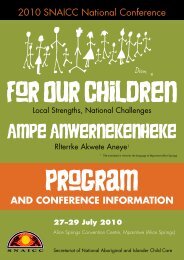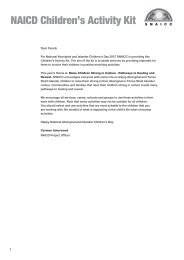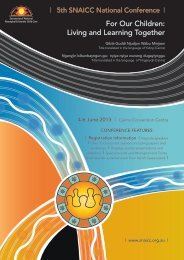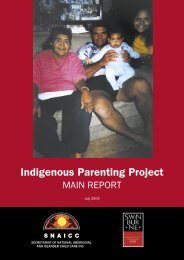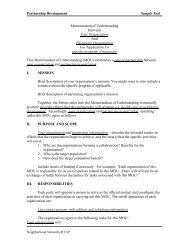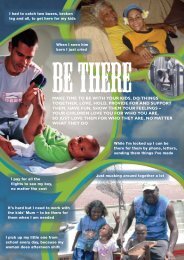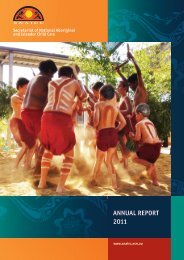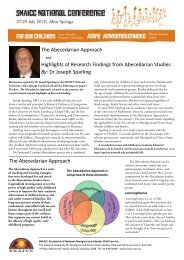Impact of the Multi-functional Aboriginal Children's Services (MACS ...
Impact of the Multi-functional Aboriginal Children's Services (MACS ...
Impact of the Multi-functional Aboriginal Children's Services (MACS ...
Create successful ePaper yourself
Turn your PDF publications into a flip-book with our unique Google optimized e-Paper software.
<strong>Impact</strong> <strong>of</strong> <strong>the</strong><strong>Multi</strong>-<strong>functional</strong> <strong>Aboriginal</strong> Children’s<strong>Services</strong>(<strong>MACS</strong>) on Children’s and CommunityDevelopmentSNAICC ConferenceSeptember 19-21Adelaide Conference CentreVictorian <strong>Aboriginal</strong> Education Association Inc.Geraldine AtkinsonPresident
<strong>Multi</strong><strong>functional</strong> <strong>Aboriginal</strong>Children <strong>Services</strong> <strong>MACS</strong><strong>MACS</strong> are:non-pr<strong>of</strong>it community based services established tomeet <strong>the</strong> social and developmental needs <strong>of</strong> <strong>Aboriginal</strong>and Torres Strait Islander children.<strong>MACS</strong> provide:culturally appropriate long day care centres where childcare is needed for work-related and respite reasonsa place for children to be safe, have a healthy meal,learn some activities that will prepare <strong>the</strong>m forschool, play with toys, and ‘keep <strong>the</strong>ir culturestrong’.
<strong>MACS</strong> feasibility studyIn March 2007 VAEAI was provided with a grant from DHS to explore<strong>the</strong> long term impacts <strong>of</strong> <strong>MACS</strong>.The study included:• A review <strong>of</strong> <strong>the</strong> literature, policy documents and reports related toIndigenous early childhood education• A focus group <strong>of</strong> members <strong>of</strong> <strong>the</strong> VAEAI Early Childhood Committee• Interviews with key <strong>MACS</strong> staff• An investigation <strong>of</strong> available data on participation and educationaloutcomes• A proposal to develop a culturally appropriate research design for afur<strong>the</strong>r larger study <strong>of</strong> <strong>the</strong> impact <strong>of</strong> <strong>MACS</strong> on educational, individualand community outcomes.
Results <strong>of</strong> <strong>the</strong> initial studyKey results <strong>of</strong> <strong>the</strong> consultation, which supported <strong>the</strong>undertaking <strong>of</strong> a larger study, were:• Very positive feedback on <strong>the</strong> impact <strong>of</strong> <strong>MACS</strong>• A high level <strong>of</strong> interest amongst informants in examiningin more detail <strong>the</strong> history <strong>of</strong> <strong>the</strong> seven <strong>MACS</strong> in Victoria• A high level <strong>of</strong> cooperation <strong>of</strong>fered by Indigenouscommunities• Testing <strong>of</strong> <strong>the</strong> research method for a larger study and <strong>the</strong>consequent development <strong>of</strong> a detailed and practicalresearch proposal
The Findings: Literature ReviewWhat <strong>the</strong> literature tells us•The value <strong>of</strong> early care and education services,particularly for children living in disadvantagedhome circumstances•The importance for young Indigenous children<strong>of</strong> having culturally appropriate early care andeducation services
Data CollectionVictorian Department <strong>of</strong> Human <strong>Services</strong> data for 2004indicates that in that year <strong>the</strong> participation <strong>of</strong> 4 year old<strong>Aboriginal</strong> children in kindergarten (preschool) was 79%compared to 93% for non-Koorie Children. The estimate<strong>of</strong> 79% comes from Koorie children enrolled in prep whohad attended kindergarten in <strong>the</strong> previous year.The invaluable role <strong>of</strong> early childhood education is beingsubstantiated by current research. It is <strong>the</strong>refore clear thatfacilitating <strong>the</strong> involvement <strong>of</strong> those Koorie children whoare not currently accessing services like <strong>MACS</strong> is a majorpriority.
Consultation findingsConsultation findingsFrom <strong>the</strong> consultations with key stakeholdersit is possible to conclude that <strong>the</strong> <strong>MACS</strong> makea significant contribution to:•reinforcing cultural Identity,•streng<strong>the</strong>ning community,•building self-esteem and confidence,•preparing children for preschool and school,and•demonstrating good practice in Indigenousearly childhood care and education.
Community Perspective“We believe in reinforcing <strong>the</strong> childrens’ <strong>Aboriginal</strong> identity so thatwhen <strong>the</strong>y go into schools <strong>the</strong>y are proud little <strong>Aboriginal</strong> kids whowould be able to cope with anything. But one <strong>of</strong> <strong>the</strong> things wealways said was we would have places for single mums so that <strong>the</strong>ywould have some respite. It wasn’t only catering for <strong>the</strong> workingparents, we also tried to give single mums some parentingpractices- we tried to do that by showing <strong>the</strong>m how to do it.”(Founding Member)
Social and Educational Benefitsfor Children• An emphasis on combining a Koorie focuswith developing <strong>the</strong> necessary cognitive,social development and gross motor skillsrequired to ensure <strong>the</strong> children are“preschool and school ready”
Parental Benefits• Parents are more comfortable aboutsending <strong>the</strong>ir children to Koorie child carethan mainstream services – <strong>the</strong>y feel <strong>the</strong>ycan have a say and be involved• The centres provide opportunities foryoung parents to seek re-entry into schooland general capacity building prospectssuch as work related training and skillingto re enter <strong>the</strong> workforce.
Community Benefits<strong>MACS</strong> play a critical role in communitystreng<strong>the</strong>ning. They do this by:•Reinforcing cultural identity forchildren who attend <strong>the</strong> programs.•Promoting active communityinvolvement in running and participatingin <strong>the</strong> centre activities and programs.
I don’t know how we would operate inEchuca without <strong>the</strong> <strong>MACS</strong> centre. Alot <strong>of</strong> <strong>the</strong> kids wouldn’t be able to goto kindergarten. The workers buybooks for children who <strong>the</strong>y identifywho would benefit from <strong>the</strong>m. It is <strong>the</strong>personal attention <strong>the</strong> children aretreated and <strong>the</strong> way <strong>the</strong> workers treat<strong>the</strong>m individually that makes <strong>the</strong>difference.” (Aunty Melva Johnson)
VAEAI•Web: www.vaeai.org.au• Email: vaeai@vaeai.org.au• Phone: 9416 3833


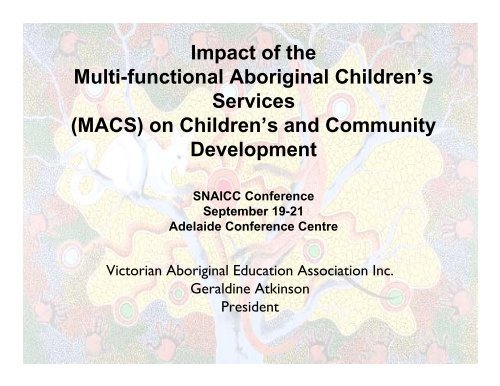
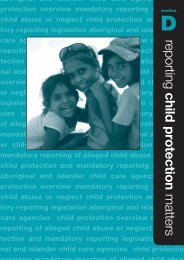
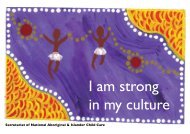
![Kukumbat gudwan daga - really cooking good food. [PDF 716 KB]](https://img.yumpu.com/47617674/1/190x134/kukumbat-gudwan-daga-really-cooking-good-food-pdf-716-kb.jpg?quality=85)
